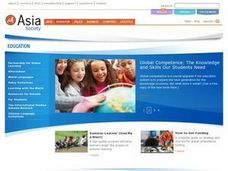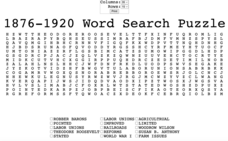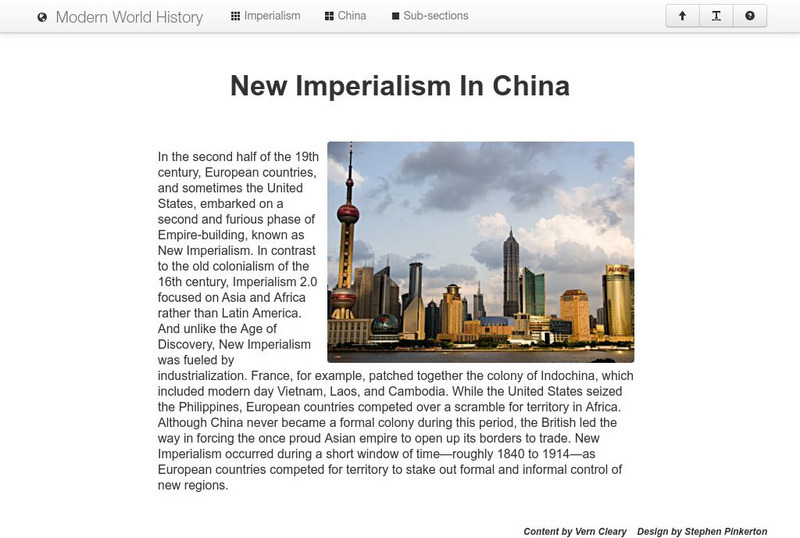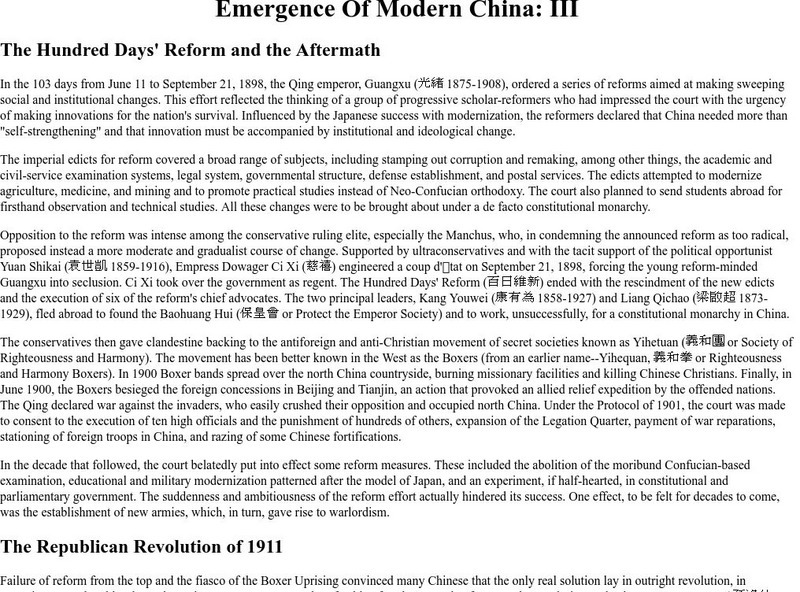Curated OER
Imperialism Old and New
If your really want your history class to know everything about old and new imperialism, look no further. This 58-slide presentation depicts, describes, and explains everything from 19th Century expansion and the Congress of Berlin to...
Curated OER
On the Road with Marco Polo: Marco Polo in China
Students trace Marco Polo's route into China and use the Internet to research major products fabricated in 13th century China. They discuss their findings and write a report on either: silk, porcelain, jade, lacquerware or tea.
National Endowment for the Humanities
The New Order for "Greater East Asia"
Sometimes the New Order becomes synonymous with its implications for European countries, but what about its consequences for East Asia? The final instructional activity in a four-part series teaches scholars about World War II. High...
Curated OER
The "New" European Imperialism
Discuss European Imperialism using this resource. This is an online world history worksheet. Learners answer 20 questions regarding the new European Imperialism using drop-down menus to select their answers for each question. They can...
Curated OER
Trade in the Indian Ocean: Should China End Zheng He's Treasure Voyages?
Students examine the amount of trade that occurs in the Indian Ocean. Using China as an example, they discuss the reasons why it ended its treasure voyages in the area and predict what would have happened if the voyages continued. They...
Curated OER
Japanese Modernization and Imperialism
Students examine the period in which Japan ended its isolationism with the rest of the world. Using the internet, they identify the reasons why Japan occupied and annexed Korea along with the country's reasons for going to war with...
Curated OER
Gandhi's Salt March, A Simulation
Learners examine Gandhi's Salt March. In this peace and tolerance activity, students discuss the Salt Tax Levy that was imposed in India. Learners then debate how the Indian National Congress should have handled the issue.
Curated OER
Traditional Chinese Garments And Their History
Students examine the traditional dress of the Chinese people and create a new story line for "The Emperor's New Clothes" set in China. This creative project allows students to illustrate pages for the new class book.
Curated OER
Late 19th Century U.S. Foreign Policy
Eleventh graders discover that many of the issues the United States faces today elicit the same type of political, philosophical and moral debate that has divided the country in the past.
Curated OER
Entering the World Stage
In this American imperialism worksheet, students review a chapter as they define 5 vocabulary terms in their own words, eliminate 4 false statements, and identify 2 themes from this era of growth and challenge in America.
Curated OER
Unit on Gandhi and Ahimsa
Learners explore the history of Gandhi and his viewpoint and example of nonviolence. For this World History lesson, students complete numerous research assignments and activities over the course of nine lessons to expand their...
Curated OER
Gandhi’s 12 Vows: Training Warriors of Non-violence
Students examine Gandhi’s ‘Walk n Talk’ strategy. In this lesson on civil disobedience, students evaluate Gandhi’s non-violent method of satyagraha as an effective mode of revolution.
Curated OER
On the Road with Marco Polo
Students follow Marco Polo's route to and from China. They explore the geography, local products, culture, and fascinating sites of those regions. They record their findings.
Curated OER
Comparing Chinese And Japanese Ceramics
Pupils discuss the conception of beauty by considering and contrasting the
appearance and use of Chinese and Japanese ceramics in this lesson for the middle or high school classroom.
Curated OER
Massacre or Street Fight? A Study of Images Relating to the Boston Massacre
Fifth graders examine how the merchants of the city allowed the economy to flourish. Using primary sources, they discover how international trade helped to develop the United States. They also identify the role of Elias Hasket Derby, a...
Curated OER
1876-1920 Word Search Puzzle
For this literacy worksheet, middle schoolers look for the words in the puzzle that are related to the theme of the word search. Spelling skills are worked on.
Curated OER
From Umayyad to Abbasid Empires
You can't truly understand the present until you understand the past. Bring a historical context to you next social studies class with an exceptional presentation on the ancient Arab and Islamic empires of Umayyad and Abbasid. Slides...
Curated OER
Stolen Property or Finders Keepers
Students explore the questionable acquisition of priceless artworks gained as spoils of World War II. They become investigators and reporters looking into the matter of ownership of the world's greatest art.
Other
Modern World History: New Imperialism in China
Fueled by industrialization, European countries began empire building in the late 1800's. How did this affect China who was never formally colonized? Read this short introduction to imperialism in the late 1800's to see the consequences...
OpenStax
Open Stax: American Foreign Policy 1890 1914: Economic Imperialism in East Asia
As America's economic prowess grew, it was able to harness this power to expand its imperialistic arm into China. This mutually beneficial relationship lasted until after World War II when China became a communist country.
University of Illinois
University of Illinois: Early Trade With China: The China Trade 1830 1860 [Pdf]
In the years following the American Revolution, speed was the most important consideration for any ship even if it came at the expense of cargo space. Sailing ships tended to be small and swift so that they could outrun and outmaneuver...
Khan Academy
Khan Academy: Buddhism in Japan
Buddhism was officially transmitted to Japan in 525, when the monarch of the Korean kingdom of Baekje sent a mission to Japan with gifts, including an image of the Buddha, several ritual objects, and sacred texts. Buddhism's journey from...
University of Maryland
Chaos @ Umd: Emergence of Modern China
Scroll down to the middle of the page to read about the one hundred days' reforms and the Chinese republican revolution that took place in 1911 led by Sun Yat-sen.
Curated OER
Unesco: China: Imperial Tombs of the Ming and Qing Dynasties
It represents the addition of three Imperial Tombs of the Qing Dynasty in Liaoning to the Ming tombs inscribed in 2000 and 2003. The Three Imperial Tombs of the Qing Dynasty in Liaoning Province include the Yongling Tomb, the Fuling...






















![University of Illinois: Early Trade With China: The China Trade 1830 1860 [Pdf] Activity University of Illinois: Early Trade With China: The China Trade 1830 1860 [Pdf] Activity](https://d15y2dacu3jp90.cloudfront.net/images/attachment_defaults/resource/large/FPO-knovation.png)

